#and overall to both the narrative and the meta narrative
Explore tagged Tumblr posts
Text
*its definitely not as common nowadays as it was back in like ~2018 but ill still sometimes see someone treating flowey and asriel like completely diffrent characters or say stuff like "my favorite character is asriel but not flowey!" which to me is just... super confusing? because honestly the fact that they're the same person is, to me, one of the most interesting parts of his character. whenever i am turning flowey around in my brain i cannot stop thinking about how theres still asriel in him, like when in the alarm clock dialoge toriel mentions that she woke up in her bed with a glass of water filled to the brim, like how asriel did it, next to her after passing out on the floor, or how emotional he is, quickly becoming frustrated being just how quick asriel was to cry. or even how he still looks up to chara. he tries to pretend asriel is "long dead" but he is still the same person. despite everything, its still him.
i dont know i just feel like seperating asriel and flowey takes away so much depth from his character
#asriel undertale#asriel dreemurr#asriel dreemurr undertale#asriel#wow chara enjoyer rambling about asriel#yeah i had to mention them for at least a single sentence sue me#i love flowey tho i hold him very close to my heart#also all people that make aus in which asriel gets revived post pacifist and still acts a bit like flowey i love you#he is my scrimblo#also on another note i feel like the people that seperate them so heavily often times dont aknowladge his decent into madness#even though that part of his character is SO important to me#and overall to both the narrative and the meta narrative#lemonade ramble#txt#flowey undertale#flowey#i love my fucked up little guy can you blame me
15 notes
·
View notes
Text
The more I read danmei in my monthly book club that I otherwise wouldn’t have read or even known about, the more it becomes painfully clear that most of the mdzs fandom (and possibly the other 2 mxtx fandoms but I’m not as well versed with them) have not interacted with the genre at large beyond mxtx, and it shows in the meta analysis people make (especially westerners).
And I am not excluding myself here! So much of my initial assumptions and interpretations of mdzs has changed after reading other danmei authors, especifically the less western-internet-popular ones.
My point is this: when reading a book from a culture that is not your own and in an unfamiliar genre, it will be impossible to grasp all the intricacies and subtleties nestled within the narrative and characterization until you’ve become more familiar with the culture and genre itself.
Don’t limit yourself to mxtx. There are more and more danmei being translated into English by publishing houses and even more are fan translated.
If you’re looking for a place to start, I have some recommendations!
1. Golden Terrace by Cang Wu Bin Bai.
Literally one of my favorite books I’ve ever read in my life, and I’m an English major. It is only 2 books and both are already published, so you won’t have to wait. The most tender, loving relationship I’ve ever had the pleasure of reading about. The translation is phenomenal, and it feels very similar to Jane Austen in its diction, plot, and characterization. I literally cannot explain with words how much I love this book.
2. To Rule in a Turbulent World by Gu Xue Rou
This series is just being translated and published, so it may take a while for the other books (I think 3-4?) will be out, but don’t let that scare you away! Without too much spoilers, the vibes of this first book reminds me of Harvest Moon games. Also a very sweet and tender main couple. Plus, this book is written by a male author!! Pretty rare in danmei, at least to my knowledge.
3. Thousand Autumns by Qian Qiu
Pretty dense with lots of philosophy, poetry references, and a more traditional wuxia world. This series is finished with 5 books in total. I had a hard time reading the first book, mostly because I didn’t connect that much with the mc at first, but I loved the world building and all the information I learned. I did eventually start connecting with the mc and ended the series fully besotted! Not a quick or easy read, but a worthwhile one.
4. Ballad of Sword and Wine by Tang Jiu Qing
The first book is out for this series, with the second being published later this month. It’s going to be a long one like tcgf, so it is a commitment read—but absolutely worth it!! Lots of palace politics and more Taoist-focused martial arts (think Crouching Tiger Hidden Dragon). It is both fast and slow burn (I know that doesn’t make sense now; trust me, it will later on) and the main character is SO FASCINATING!! I want to study him like a bug. The overall characterization is phenomenal. The cast can be… intimidating, as there are a LOT of named characters, but they’re mostly there for world building (and the world building is fantastic!). Also, the translation here is GORGEOUS. You can tell it was translated by a writer, or at least someone who’s read the whole text (you’d be surprised…)—everything is so vivid!
#mdzs#mxtx#mdzs meta#my mdzs meta#danmei#golden terrace#ballad of sword and wine#thousand autumns#to rule in a turbulent world
146 notes
·
View notes
Text
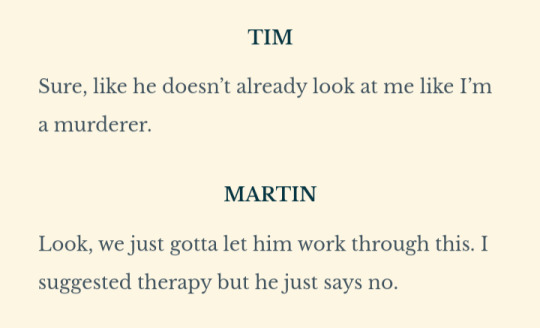
there's a lot going on in the mag 58 supplemental, this one little scene does a lot of heavy lifting to set up martin and tim's arcs for the rest of the show, but I want to focus on these lines particularly because of how therapy comes back as a symbol in s4/s5.
broadly, in the context of the meta plot and not the individual statements, seeking therapy in tma is representative of trying to improve oneself and get out of a bad situation. later, when taking melanie to therapy, georgie suggests that jon should get some as well but, when asked, says she wouldn't be willing to escort him like she does with melanie, showing how she does wish the best for jon in theory but doesn't think he actually wants to get better, or at least that she's not sure enough to involve herself with him.
that view of jon doesn't come from nowhere, because here we have an instance of him rejecting that same offer, symbolically rejecting help in favor of digging himself deeper on his own (obligatory disclaimer that irl therapy is a very personal thing and says nothing about one's overall character, this is just an examination of a motif in fiction). the word choice of "he just says no" imo implies that martin has suggested this multiple times and jon keeps giving the same answer, continually reaffirming that he does not want outside assistance to pull him out of this spiral.
the fact that martin's the one advocating to go soft on jon despite repeated refusals for more sympathetic help is interesting to me, because I would guess that this conversation was instigated by jon aggressively confronting martin about trevor herbert two episodes earlier. we know he was stalking all three of his assistants, but that is the biggest and most threatening outburst we get from jon in this period, and in this conversation it is still martin being defensive and apologetic vs tim being frustrated and pissed off.
I've said recently that I'm pretty sure martin believed jon was self harming and/or suicidal at this point, so I can see why he would be particularly willing to give jon slack and try to prevent any big conflicts, but that still contributes to his current narrative role of "guy who is treated the worst but ignores it because he's also the guy who cares the most." in that way, he's a foil for georgie; she cares, sure, but not enough to ignore (perceived) risks. martin pushes for jon to get therapy even as he lashes out and rejects help, and georgie won't involve herself when jon asks if she'd be willing to help him see a therapist.
this motif comes back around for a final complication in s5, when laverne, melanie's therapist, winds up as part of her cult. melanie's effort to get better and get out did have lasting effects, she is separated from the watcher/watched system and is coping a whole lot better than she would have before, but those personal efforts still weren't enough to fully get her out of the whole mess. no amount of individual action could remove her from this structural problem, her therapist helped her a lot but also now thinks she's a prophet.
which also comes back to the above scene. tim and martin both write off elias as useless in this situation, so they start sniping at each other and talking about how to stop jon from doing what he's doing without even really lingering on how the guy who is actually in charge and has power over them all is making it worse by neglecting his managerial duties. I'm sure jon could have done with some therapy at this point, but that would have only dealt with, like, 10% of the archive gang's current problems.
208 notes
·
View notes
Text
Marineford Law is no question interesting to me because he pulled off a surprise, motherfucker moment and the timing was so good to the point that both pirates and marines least expected it.
Before I proceed with this self-indulgent lawlu meta post, I will go ahead and say that everything that happened between them in Marineford is a catalyst of establishing their connection later on in the future arcs. I am a firm believer that those feelings™️ started to truly bloom in Punk Hazard and went downhill in a good way in Dressrosa.
Long post ahead. Enjoy!
When I was rewatching Marineford arc, the part where Buggy was already carrying an unconscious and injured Luffy and Jimbei, their conversation sparked my interest.
Highlighting the bit where Buggy was confused about Law's verbal tic of using the suffix -ya in referring to anyone, overall doubting him, then asking for Law's name. Don't forget that Law is a little shit (affectionate) so he proceeded to ignore all of those questions to say this:
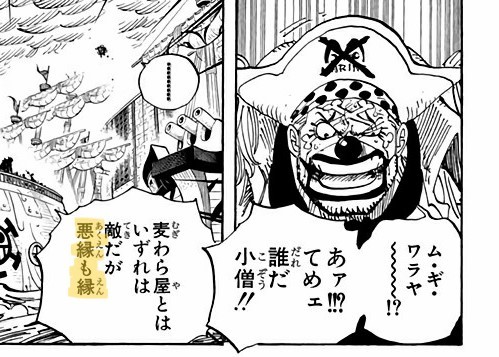
Interestingly enough, this part is tricky to translate. I found two translations that closely encapsulate what Law wanted to say here but mind you, and I will sound redundant about this with everything that has got to do with Trafalgar Law's speech patterns: he likes speaking in runarounds, purposely using terms with double meanings and connotations on them, and he's both reticent and cryptic. (I wouldn't say not to trust on his words but don't take them at face value.)
Law described his connection with Luffy as 悪縁 (akuen) which directly translates as evil destiny or connection.
Forgive me for a bit of sidetracking but the kanji used for akuen is the same with Robin's epithet which is "Demon Child" (akuma no ko). To further elaborate, 悪 (aku) means evil--both as intent and violating a moral code. It is also used to refer as the direct opposite of good.
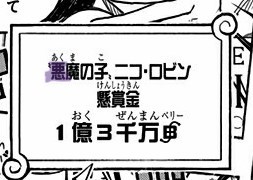
Going back to 悪縁 (akuen), in true Law fashion, this word doesn't only mean evil destiny or connection. Depending on the context, it can also mean unfortunate love.
(It sounds tragic coming from him, isn't it? If your mind was blown after this part, no worries, I am too. This part gave me so much whiplash when I was researching about it.)
So, considering these two interpretations of 悪縁 (akuen), that begs the question, what is Law's connection with Luffy?
On surface-level, they are enemies as Law said so himself. They're rivals when it comes to One Piece. Their common ground, which is only known among people that Law trusts the most, is sharing the same secret name of D. However, I will take one step ahead and say that they both went through the same tragic fate of losing their loved ones, for being weak and powerless to protect them. They were both involved in circumstances where if they were capable enough, they could've saved the person they loved the most. Doomed by the narrative and subjected to trauma that breaks their heart and spirit should they be lesser men to handle such misery and grief. It is unfortunate, disastrous, and cursed to love fully knowing the fact that the other person could die like the ones before them but these two have the biggest heart.
Of course, Law will never say it directly. Thus, settling for 悪縁 (akuen).
It gets better. He did say 悪縁も縁 (akuen mo en) and 縁 (en) itself means fate or destiny (especially a mysterious force that binds two people together). Additionally, も (mo) is also a particle that is used for emphasis.
The implication, in turn, of what Law said to Buggy can be translated this way: Strawhat-ya and I (will) eventually be enemies, but an evil connection is (the futuristic possibility of Luffy becoming his enemy) is fate (that binds them).
Law made sure to emphasize that their "evil connection" is fate: specifically, that mysterious force brought them together and compelled him to be there, that he was meant to sail to Marineford, and help Luffy escape.
These two translations are the closest that I found to be accurate but it's still scratching the surface of what Law said:

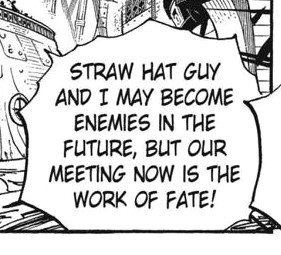
This entire panel between Ivankov and Law makes it funnier because he clocked him IMMEDIATELY.
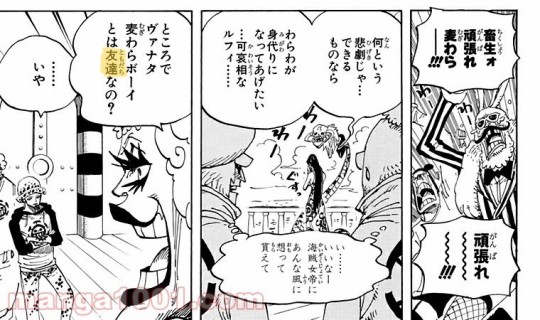
Ivankov asked if he's friends with Luffy to which he replied: no.
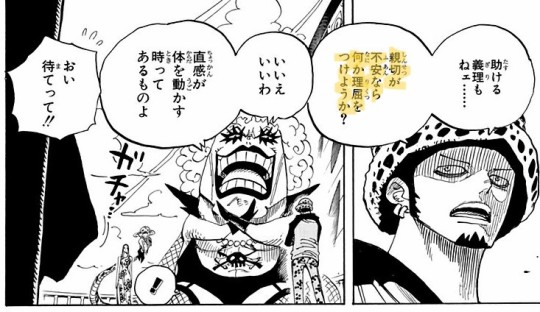
He also emphasized that that he doesn't have any obligation to help him but then went on to say this:
親切 (shinsetsu) means kind, generous, gentle, considerate. 不安 (fuan) refers to anxiety, uneasiness, worry, apprehension. These are surprisingly direct words but of course, Law had to go back and be cryptic again when he followed up with 理屈 (rikutsu), which could mean two things: theory, reason, logic or (unreasonable) argument, excuse.
I think this panel did a good job for translating it.
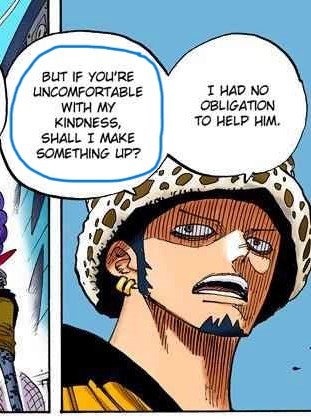
Law himself is providing Ivankov here the benefit of the doubt. To reiterate, Ivankov beats him to the punch which makes their entire interaction so funny.
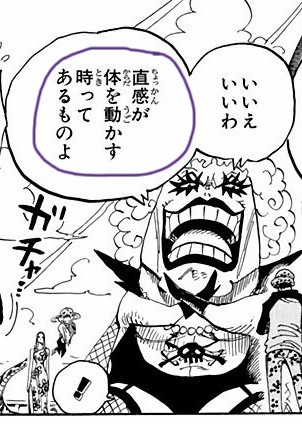

Again, brilliant translation for directly calling out Law's bullshit. Lmao. Ivankov says 直感 (chokkan) here. It means intuition, instinct, hunch. Please take the next statement that I will say with a grain of salt but "instinctively moving your body" is usually associated with the context of being reckless to the point of directly exposing oneself to danger, consequences be damned, in order to protect someone.
Even Law himself acknowledged that he's not obligated to be there, so why?
Unfortunately, this is the elephant in the room that Law will never address. Several characters even made sure to point out that he helped Luffy two years ago and he purposely dodges that topic.
One thing I can guarantee is that Law never did it to get Luffy to agree for the alliance. Hell, he thought of the alliance after reuniting with Luffy! He adjusted his plans by then. Additionally, he never used the fact that he saved Luffy's life as his bargaining chip and leverage to get him on board the alliance.
Lastly, this is too much for saving a life on a whim, isn't it, Law?
#one piece#one piece meta#marineford#monkey d luffy#luffy#law#trafalgar law#lawlu#istg marineford lawlu was the catalyst#this is self-indulgent at best#the feelings started at punk hazard and I am a firm believer of that#but you can't convince me that these moments between them didn't start something#it's clear from the get-go that law was interested to luffy#respected both the strength and the craziness even#don't even get me started on the ace and law parallels#ace protected luffy's life and law saved it#FUCK I AM NOT OKAY#mochiajclayne.txt#to highlight being interested in someone doesn't automatically mean romantic okay#that interest was enough for law to go in the middle of a war apparently#yeah I missed the alliance and I MISS LAWLU#lowkey wished luffy knew that law was holding his hat THE ENTIRE TIME in amazon lily#the anime did good on that scene tbh#he way his hold tightens on the brim of the strawhat when rayleigh said he knew luffy would be in amazon lily#still cackling at the “i was sunshine” “i was gay” lawlu tweet because it's so them
127 notes
·
View notes
Text
I have been pondering the recent rash of "post canon NHS and LXC would never ever reconcile bc even if NHS wanted to have Er-ge back, LXC would never ever forgive him for [insert reason of choice here]" type of posts + the "do you think NHS thinks very hard about how much Da-ge would hate him for becoming [the way that he is now] by choosing to seek vengeance" type of posts, and I think fundamentally the reason these posts do not jive with me is that we have no indication, in the show or in the book that uh, NHS gives a shit about either of these things very much anymore?
The first type of post is predicated on the assumption that LXC's forgiveness or lack thereof some some sort of either extension of mercy (which NHS obviously does not deserve <- or so assumes the post) or some form of punishment (which is obviously the correct answer) but the last scene we get with NHS both in the book and the show make no indication that this is a thing he wants? Or cares about? Book NHS has *sauntered off* with his little hat trophy and Show NHS walks off screen after saying something along the lines of "What is my responsibility I won't shirk, what isn't my responsibility I won't care about." Now, arguably, show NHS is having a worse go of it emotionally, but shows no real inclination or interest in either apologies or making up and being friends again with LWJ, LXC, WWX, or other people. Book NHS seems pretty pleased with the outcome of the events as a whole?
The second type of post is predicated on the fact that NHS finds Da-ge's judgement a horrible burden to bear at this stage in the game, which! He might! But again especially in the book we get no indication that he has any fucks left to give about what Da-ge may or may not have wanted since Da-ge is dead. In both the show and the book, NHS went about revenge taking very specific and complicated actions with the desired result of JGY dying, but he certainly took the scenic route getting there, which, he didn't need to? As I've written about before, JGY didn't see him as a threat. If he wanted JGY dead he could've arranged to poison JGY's tea like, 10 years ago and had done with it instead of his complicated Rube Goldberg life ruining scheme. If he is still sickly anxious about how Da-ge might feel about the scheming and the trouble causing and the whole everything, that's certainly possible, but he must've decided it was worth it anyway regardless of that, and I don't know that it necessarily would've changed just because he got what he wanted at the end.
Overall, I think as a fandom we think a lot about like "will and should this relationship ever be repaired or similar to how it used to be?" and "does this character deserve/not deserve the forgiveness of people they've hurt or abandoned?" which can be interesting questions! I do feel like these are often taken as "is a character morally good (deserves to be forgiven) or morally bad (deserves to rot in hell forever never forgiven ever ever)" and based entirely on if Character is the meta writer's blorbo. Under this paradigm the concept of "Character did bad things to get exactly what they wanted and were happy about that and no relationships were ever repaired and the emotional detachment of people they used to care about no longer matters to them!" is uncomfortable.
It's just that for NHS I've increasingly come to the conclusion that canonically, I don't think NHS thinks he has anything to apologize for, nor is he super interested in being forgiven! He got what he wanted the way he wanted it to happen. Which is potentially supremely unsatisfying but I think is very sexy as a narrative concept.
#like for the record#nie huaisang IS my blorbo#and I like a good reconciliation fic and nhs is feeling some kind of way about everything fic like#at LEAST as much as the rest of us if not more#but these POSTS I keep seeing mostly serve to bludgeon him with the 'punishment' of LXC's unforgiveness or NMJ's judgment#as a means to say he was wrong and should repent and probably shouldn't've murdered JGY or something#I don't think this punishment works canonically because he appears to give no shits about this anymore#anyway#meta#my meta#nie huaisang#nie huaisang my beloved
329 notes
·
View notes
Text
Katsuki as the Light & Izuku as the Dark- Love and Harmonious Totality in The New Era
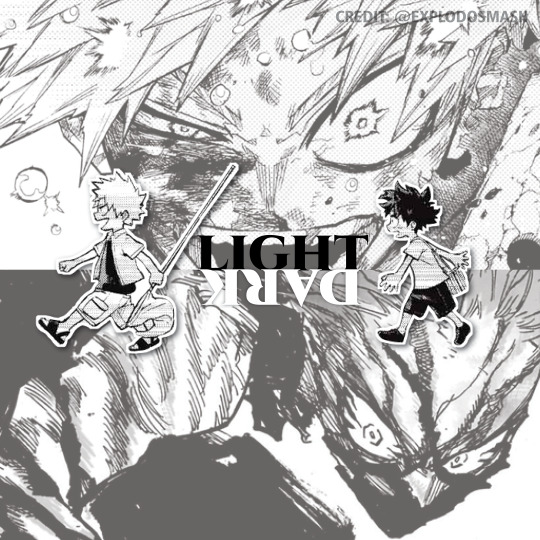
This meta analysis’ purpose is to make the case for KT/DK existing as Light and Dark in each other’s stories respectively, and explain how this dichotomy challenges black & white thinking in the narrative.
This meta analysis will also explore how this Light/Dark dichotomy lays the groundwork for why Katsuki/Izuku as a unit represent a “New Era" in the story.
[Can also be found on twitter]
Whether by Save to Win/Win to Save, or the fact they are osananajimi, the story frequently draws our attention back to Katsuki and Izuku’s complicated, influential and powerful bond. Despite all the changes they’ve gone through in MHA up until now, both individually and together, one thing has always remained constant: they are as symbolically connected as they are physically/mentally/emotionally.
We argue that one of the ways MHA’s narrative connects them symbolically as polar, balanced parts of a larger whole is through a sense of DUALITY.
Furthermore, we argue that the use of contrasting Light/Dark motifs act as both visual and text metaphor to create this duality, with Katsuki representing Light and Izuku representing Dark.
It's important to note that by Light/Dark, we aren’t referring to their moral clarity, goodness or badness. Rather, we will explore Light/Dark as a metaphor that builds on themes in MHA while creating tension (contrast, conflict leading, fear and rejection) and harmony (balance, unity, love and acceptance).
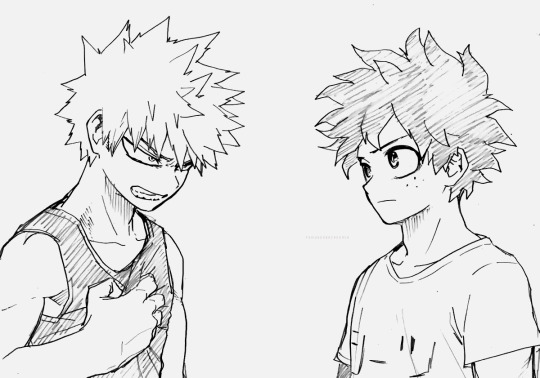
Note: the Light and Dark comparisons/metaphors between Katsuki and Izuku used in MHA sometimes get lost in translation in the anime. Here are some examples….
For Izuku:
Izuku is often encased in shadows in Katsuki’s POV since the beginning.
The word used for quirk (kosei) meaning “personality”, with quirkless meaning “lack of personality”, evoking the absence of something
Character design leaning on “dark” shades (dark/filled in hair, eyes including dark pupils early in the series)
Izuku’s “Dark Hero” arc as it’s officially titled.
Izuku’s prototype/beta name “Yamikumo” meaning Dark Cloud and his personality type tending toward facades/anxiousness
Blackwhip being the OFA quirk that resonates with Izuku’s emotions (particularly his rage)
His recent “power up” moment in the current arc involving blackwhip is denoted by claws, fangs and black tendrils. This form is officially called “overlay” but Hori also calls it “carnage” in his head.
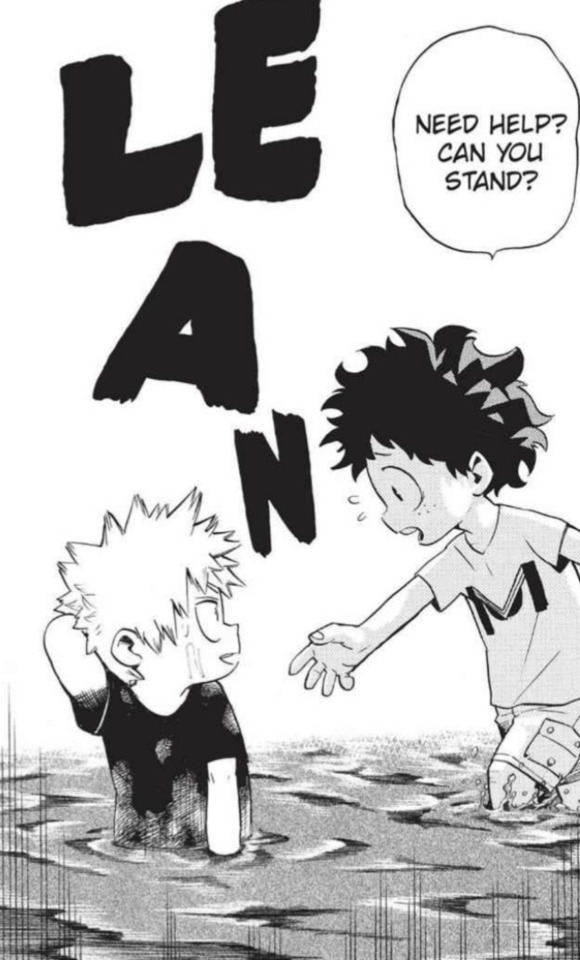
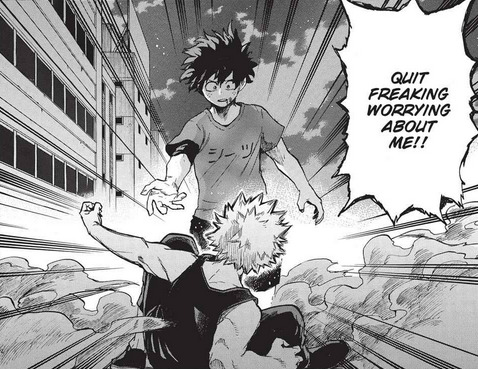
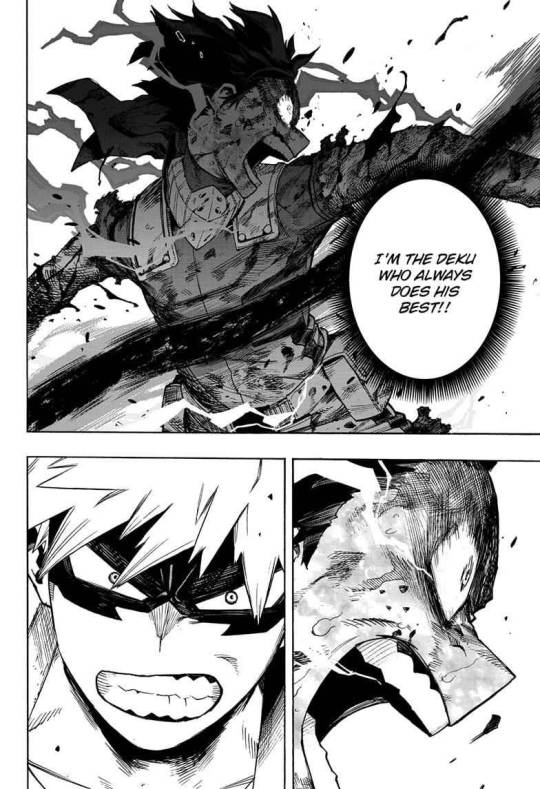
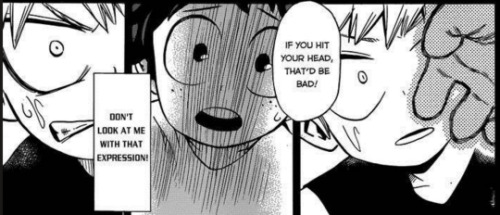
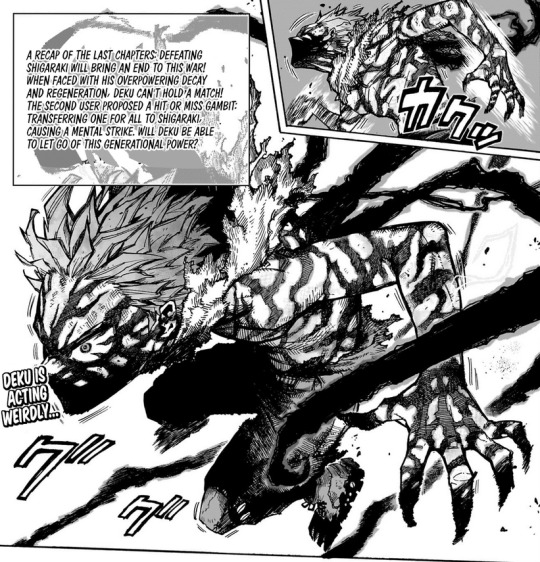
And for Katsuki:
Izuku’s description of Katsuki as someone bright and blinding, often bringing light into his eyes as an artistic consistency.
His quirk “explosion” emitting light, his move “stun grenade” literally a blinding flash of light.
Character design leaning on “light” shades (light hair, eyes aren’t filled in)
Prototype/beta ‘Gogo’ Katsuki’s light clothing and his personality type overall being bubbly and overprotective (toward Yamikumo).
Katsuki’s death chapter titled “Light Fades to Rain”, and his revival evoking that visual of a bright light.
His recent “power up” moment in the current arc is denoted by flashing lights and explosions all around his body - highlighted with laughter, and glee.
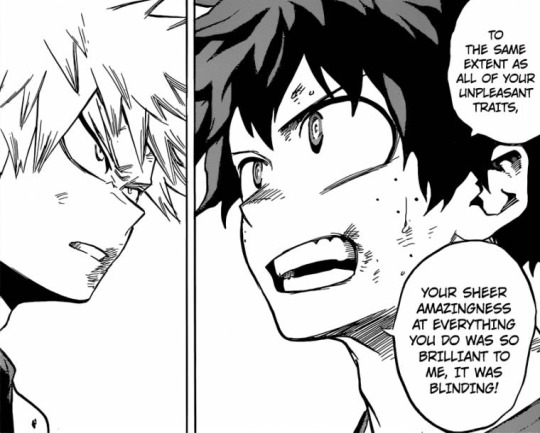
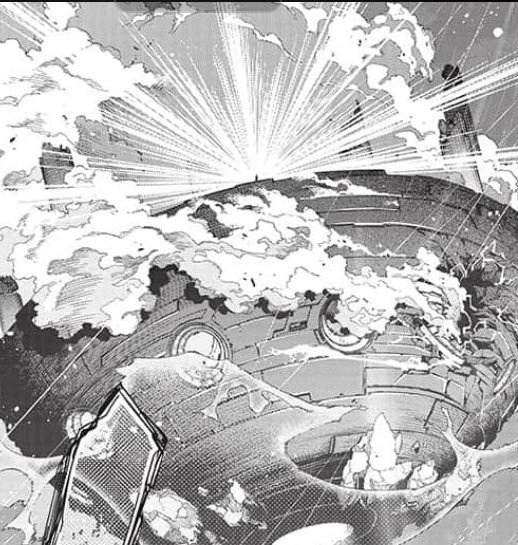
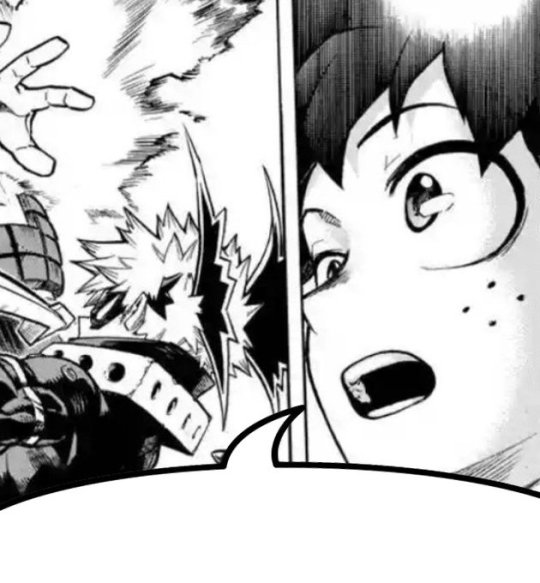
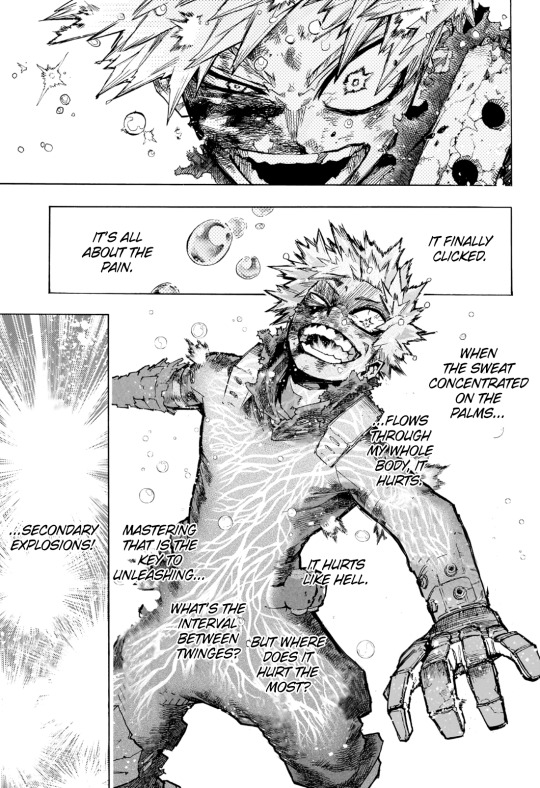
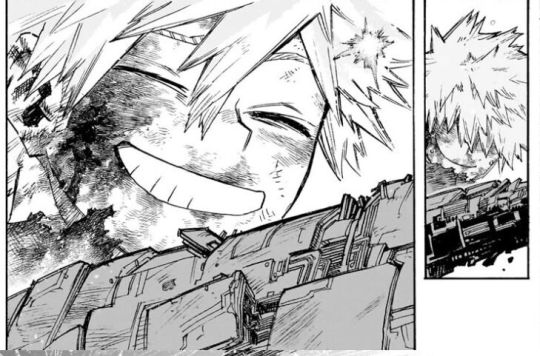
Katsuki and Izuku connect with all the various opposites attract concepts that draw on the Light/Dark duality (sun/moon, yang/yin) but the first mistake people make is approaching these concepts with black & white thinking in mind.
The meaning
The Light/Dark imagery/descriptions/metaphors with KT/DK exist as a set piece that subverts expectations by challenging binary/black & white interpretations.
Katsuki’s ‘light’ is confident and inspiring - but it can also be blinding, harsh, and overwhelming.
Izuku’s ‘darkness’ is almost like a blanket. It’s comforting and sympathetic - but it can also be scary, unnerving, and mysterious.
Initially, Katsuki wanted to get away from the ‘darkness’. Izuku was like his shadow, following him relentlessly. He misinterpreted Izuku’s behavior as secrecy or deceit.
Izuku dragged in as much ‘light’ as he could, by both observing Katsuki closely as well as refusing to part with the nickname ‘Kacchan’. His pursuit was a combination of hope for the future and a fascination for something he didn’t have (envy).
Both of them have a capacity for unending love and selflessness, but also uncontrolled rage and violence.
The point of this contrast is for us as readers to highlight and dismantle the surface level perceptions of these characters in the same way Katsuki and Izuku progressively do for each other.
Building on the themes
In the same way Izuku always saw, and admired, Katsuki’s “light”, Katsuki could see, and feared, Izuku’s “darkness”. This contributed in building tension between the two, both literally and narratively. Where another story may have framed them as opposing forces, however, MHA frames them as dual forces. Where the source of tension for opposing forces may be fundamental differences, the tension between Katsuki and Izuku comes from a REJECTION of their fundamental parts. By extension, this became a rejection of their potential for harmony.
There’s enough evidence to suggest the defining concepts for prototype/beta Katsuki and Izuku(Yamikumo) weren’t entirely discarded, but rather modified and layered upon. One of the major differences was how prototype KT/DK got along, with one of the earliest scenes drafted for MHA being a scene where they fight together.
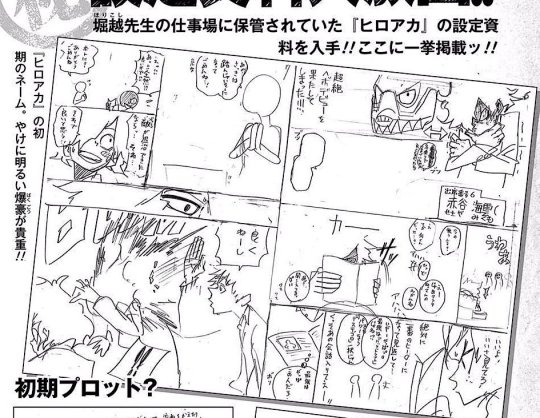
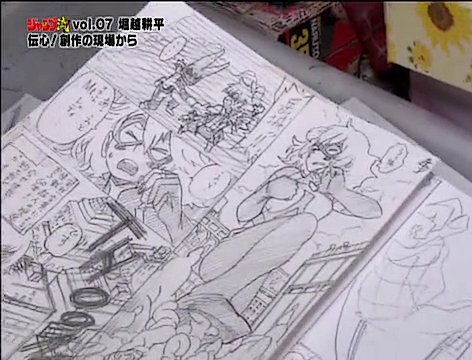
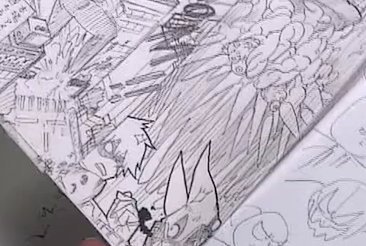
It’s ultimately a mistake to presume Izuku is purely a positive ray of sunshine just like it was a mistake to assume Katsuki was hiding a bitter and villainous darkness within him. It’s the neglect of their core that causes them to dig their heels in and become their worst selves:
Katsuki as egotistical, harsh and tightly guarded with a tendency to lash out, against Izuku as obsessive, obstinate and habitually repressing his emotions.
Society shaped their “quirks” (their power, outward appearance) but time and relationships informed their “individuality” (their ideals, hopes, inner drives).
Izuku's unwavering belief in Katsuki’s light was a tether that enabled Katsuki to embrace and flourish into it. Katsuki grew to understand the darkness in Izuku by confronting that which scared him. This allowed him to empathize with Izuku’s complex thoughts/feelings during a time where Izuku was at his worst (“Dark Hero” arc–onward) and dedicate himself to making sure Izuku didn’t carry the weight of the world and its burdens on his own.
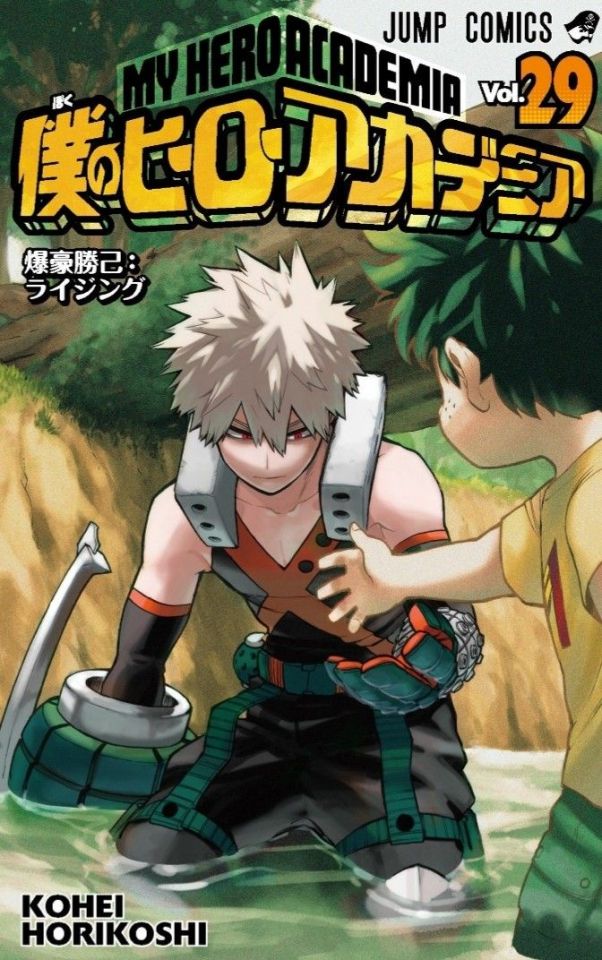
In other words, the inevitable payoff for KT/DK facing and dismantling the tension within themselves and between each other is the harmonizing of the dual/complementary themes they’ve been written to represent, which ultimately mirrors the main messages and questions posed by MHA.
‘The New Era’
As two major pillars of the story, Katsuki and Izuku are in many ways microcosm(s) of MHA society at large.
Katsuki and Izuku as complementary forces and not opposing ones seems obvious until it is put into practice. Some characters in the story and many readers in the audience alike have struggled with understanding their multifaceted nature and reconciling what they know of KT/DK from the outside with the seemingly contradictory information KT/DK have given us about themselves over time. Rather than a fluke, this contrast is an intentional writing choice evidenced by elements like their Light/Dark symbolism.
The lines at the main center of conflict in MHA - Heroes vs. Villains - has been long since blurred. In much the same way Heroes vs. Villains has complicated good vs. evil and challenges black&white thinking, KT/DK’s relationship as counterparts is representative of a greater duality that paints a clearer picture of MHA’s philosophies on the nature of heroism, societal progress, and the difficult process of inner growth. This picture is coming to a head with the story situating them as the beginning of “A New Era.”
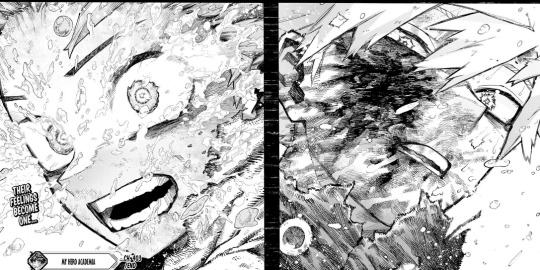
MHA understands people as collections of thoughts, feelings, experiences, abilities, ideals, hopes, drives, etc., and that contradictions and tension between them are inevitable.Through KT/DK, MHA has developed a beautiful narrative where strengthening oneself involves strengthening each other and broadening our understanding of who we are.
“There is a false saying: “How can someone who can’t save himself save others?” Supposing I have the key to your chains, why should your lock and my lock be the same?”
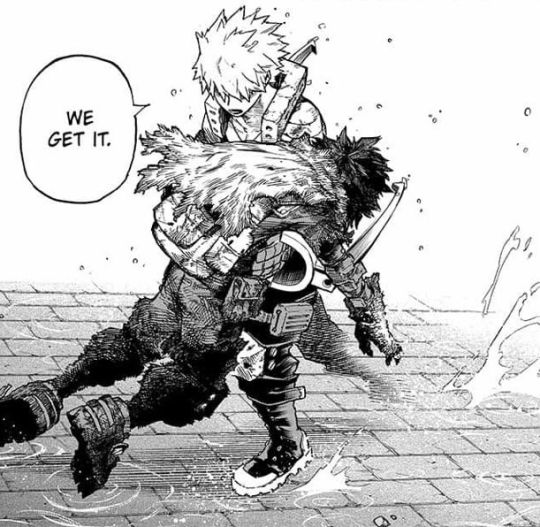
271 notes
·
View notes
Text
So. orvs metatextual nature and gay jokes. orv is an action fantasy book, a genre designed primarily for men and starring men. now most of these books are not gay, but there is often a tendency by audiences (particularly female audiences) to see some level of romantic tension between male characters. orv is no exception to this. some authors respond with outright hostility when they see fans shipping their male characters, and some simply ignore it completely - but some go the route sing shong does, and play it for laughs. before i go any further, i would like to clarify a term i will be using - shippers. while this literally refers to readers who think there is romantic potential between two characters, i will be using to specifically refer to instances where those two characters are of the same gender. im doing this because i cant think of a more elegant word to be completely honest, and this is tumblr meta so who cares.
orv is a metatexual narrative which is aware of its genre and aware of its readers. those readers are represented in the narrative, and sing shong knowing that fans would see a possible relationship between kim dokja and yoo joonghyuk made sure to represent that too. so we get uriel, the fujoshi angel who is constantly reading into kim dokjas and yoo joonghyuks relationship in a way that is often played for laughs. now ive certainly seen worse depictions of ‘shippers’. uriel is treated with affection by the main characters, who genuinely like her (and the fans she represents by association). her love for joongdok is implied to come from her having a crush on her friend and projecting, which i see as a kinder depiction than the usual ‘slavering fujo’ trope.
and perhaps most importantly her engagement with the story seen as just as deep as any other reader if not more so! uriel is one of the characters we see most changed by kim dokjas story - in every other universe shes a fierce and furious warrior, and while she never hesitates to kick ass in this round either, kim dokjas story has given her a solace that has made her significantly softer. she helps him out sooner than any other constellation, saving his ass in many ways during the demon world arc, demonstrating a deep investment we are clearly meant to be grateful for. wherever it comes from, uriels engagement with kim dokja’s story is shown to be a genuine and deep one appreciated by the characters. through this sing shong is almost directly speaking to the shippers in the fanbase who are often mocked or disregarded, saying that their love for the story is important too, wherever it comes from. i see this as sweet, and i like that unlike so many other authors sing shong recognise the role shippers often have in a story’s success.
however, i hesitate to give sing shong too much credit. because along with the genuine appreciation of uriel as a character and all she represents, there are jokes mocking her and those like her, and there are a lot of them! like i said above, sing shong wrote orv as a metatextual narrative that engages not just with the genre but with the genre’s fans. sing shong knew that people would ship their characters, as that is what happens with books like orv. and so they wrote in many jokes about it, jokes based around the ‘silliness’ of those who would assume kim dokja and yoo joonghyuk have romantic feelings for each other. and given orv’s metatexual nature, this also mocks the nature of shipping itself. when someone assumes kim dokja and yoo joonghyuk are together and they react with disgust, as frequently occurs in the earlier parts of the novel, we are meant to laugh not just at the misunderstanding - really, these guys gay, how silly. but we are also meant to laugh at the idea that these Protagonists are homosexuals, and at the people who make those assumptions. its a simultaneous acknowledgement and mocking of the queer undertones of both this story and it’s genre.
so you get this overall impression of a narrative that ultimately loves all of it’s readers, including shippers, but also isn’t afraid to say it thinks all that gay stuff is kinda silly. and while ebook edits have largely removed many of these gay jokes, an undercurrent of this still remains. from what i know this largely reflects sing shongs actual opinions at time of writing, whether or not they have changed later on.
dont get me wrong, i love orv, i love joongdok, i love their relationship and i do read it as romantic. i too read the scene where lee gilyoung insists kim dokja is into men and kim dokja responds aghast and gone ‘haha, gay’. as a queer person in the webnovel scene i am no stranger to taking homophobic moments like that and reclaiming them, making the characters queer and pretending the author is laughing with me and not at me. im not trying to preach to anyone here. but i also think its important to acknowledge the conversation orv is having here - its valuing of shippers and its mocking of queerness, and where they overlap.
82 notes
·
View notes
Note
hi, love your work a lot! it manages to blend coherence with layers of esoterica, in a fun & meaningful way. do you have any big influences with your style?
Writing this as a narrative because my whimsicall mind can't seem to organize information logickally otherwise
So
When I was a child my Dad would show me a lot of comics/cartoons in all different styles/eras and so I was internalizing comic book logic from the very beginning. He really liked American comix both capes and Indie stuff but was also into franco belgian artists and let's be clear my papa has good taste so I was readying good stuff though I couldn't remember it all too reliably... Also Comics Journal, so I was reading comics & meta about comics. So basically I have like a deep archetypal brain stem dark spring of mind that spits out raw comic information like a dream that I can't place until I rediscover them, and a lot of deep unremembered imprintations that R kinda roiling around under the surface #Stupidsoldier
N then I was a deviantart kiddo and a reading manga at barnes and noble kiddo, and then I went and got a formal art education and learned about all these artists that sort of did pseudo comics or cartoons but didnt articulate it that way-- The German xpressionists are a big example of this -- and also about overall principles of like scale and hierarchy and time and presence -- and also just that I really like drawin the human figure in particular :)
I'm really grateful that my parents especially my dad were actually really supportive/invested in me being an artist even though they had very little faith in my character or overall competence. so I was always doing art activities to make me better at drawing because that was like the one redeeming quality I had, a lot of household resources went into me having art tutoring or doing community classes, and I was really strongly encouraged to get ma BFA
So 4 influences well I like things that are very stylish but very specific in how they represent figure N physiognomy... Naoki Urosawa & Jeff Smith were fascinations 2 me along this line... Arakawa is good too... I feel like this is a strength of American and British cartoonists generally but struggling to think of names
My favorite painter is tied between two commies: Siqueiros, who was a Mexican muralist and chaotic socialist, really specific markmaking and texture, pathos drenched figuration, charged epic landscapes, and Petrov-Vodkin, Russian ikonographer who became a propagandist for the USSR, semi-social-realist, semi-ikonographic compositions in which space is wrapping around itself to organize human figures according to a mythological logic, flattish, very cartoons/comics aligned, strange treatment of color but all really effective
History painting overall is everything to me it really doesn't show in Coward but I think it shows elsewhere some of my other dramatic sensibility is a lot from 00s action movie shlock which I would always enjoy to go see when I was younger and was somehow fascinated with the environment of government buildings and prisons and secret operations happeningunder the surface of every day life erupting into wet violence of men punching each other
I love the movie THE RAID redemption !!!!
I learned a lot of the logic of pacing N building pages around Tezuka's work as well as FMA N Death Note I think were big 1s to teach me that logic. Tezuka is a really good artist to look at for how to compose a page that supports the energy of the events that are happening on it, not that that's something I personally am good at. Favorite mangaka for tone and environment and visual identity are Katsuhiro Otomo, Tustomu Nihei, Suehiro Maruo, Nishioka siblings, Hideshi Hino
A lot of my sense of timing is also from news paper strips tbh. It's just a gut thing to me at this point hehe , Character design is also a gut thing for me I draw a little thing and I can either ensoul it with psychosexual fixation or I can't
I was born in the hospital Henry Darger worked at St. Joe's he's an ancestor to me but ofc inimitable by virtue of GOD being his sole audience
As for the esoterickal dimensions I feel like it's all it's own post let's just say I lack the inclination and ability for systematic and rigorous study but I am really interesting in gathering little packets of information and arranging them into dioramas and the longer I do it the more packets I accrue
I want to make a list of artists on here that I like/admire sometime too but that's too much for me rn. I also suspect a lot of people R mad at me for arbitrary reasons just as I also am mad at a lot of people for arbitrary reasons so I dont wanna bother no one ...
Oh well so I'm intentionally reorganizing how I draw right now because I sense a shift in my trajectory again so thanks for making me reflect
91 notes
·
View notes
Note
I had a long argument with someone on whether or not stomping Belos before he dies was better than letting him die pathetically, and I asked myself if that is what fans really believe in... or if they would hail any Belos' death as the perfect one if Dana choose a different one?
They also justify the stomping as being part of horror-comedy genre and that Belos should not have any dignity what so ever because apparently letting him die in despair with no stomping is running the risk of making the audience feel "sorry" for him.
Honestly, these justifications make The Owl House feel more shallow. Like, why shouldn't the audience be allowed to feel sorry for Belos? What is the danger? That people would agree with Belos' views?
Or are we supposed to develop a black and white view of the world akin to a conservative view but inverted? And then hide behind the horror comedy genre to justify less drama? I hate to say it, but Nostalgia Critic is right about Belos being this strange outlier. The show seems to be afraid of actually doing a complex, tragic and yet irredeemable villain.
It doesn't make any sense to argue that Belos' death fits because of toh's genre as a horror comedy because the scene was neither played for horror nor laughs. At best, you have the image of Philip slowly being dissolved by the rain and then Raine's smug "that was satisfying" line. The overall tone of the scene is one of contempt as Philip tries one last plea to Luz only to be snuffed out (and weirdly validated) by the heroes. Its intent is to be cathartic for both audience (though as you know doubt know, YMMV) and the characters.
Frankly, despite its marketing, I don't see toh as either a horror or a comedy because it spends more time on slice of life stuff and high school teen drama and romance. And even when it does go for the horror and comedy, both are rather tepid. You want a real example of a horror-comedy for kids, then go watch Courage the Cowardly Dog or Invader Zim.
The reason why I argue the heroes validated Belos is because in the moment of his death, he clings to the idea that as humans, "we're better than this!" It's a moment of pathetic delusion that is appropriately met with silence but then it's ruined with Eda and Co. barging in with "Well, we ain't!" only to then prove his point by mercilessly stomping an already dying man to death. There's a reason why kid shows usually end with either the villain being imprisoned or not outright being murdered by the heroes. Evil has to die by its own hubris, not get killed by the heroes after the Big Battle when they're no longer a threat. I made a post about the importance of defeating a major antagonist twice.
Belos' death also doesn't work with a "Kill your oppressors" theme because the show isn't about that. The show barely spends any time showing why the EC is bad for the Boiling Isles and Eda is the only named wild witch we see getting harassed by them and even then, it's mostly played for laughs given how inept the coven scouts are (seriously, they're able to quit without fear of repercussions).
I think a reason fans are split on Belos' death is because of differing expectations; the fans who paid attention to Belos and the implication of his backstory and waited for every lie to come crashing down on him since that's what the show seemed to be building up to only to be unceremoniously ignored in the end were no doubt disappointed. Then you have the other fans who hated the character to the point that any gruesome death will do, regardless whether it made narrative or thematic sense or not.
Ultimately, I think the biggest reason his death doesn't work is because Belos fails as a villain.
Belos' status as a colonial puritan only works on a meta-level; it serves a cathartic release for marginialized people to see a representative of real world oppression beaten by queer characters as it fulfills the fantasy of finally overthrowing an oppressive system. The fatal flaw though is that none of this works on a narrative level because the coven system is either treated as a joke or simply a career path one must choose and we never see the disenfranchisement of wild witches. People largely get off scot-free opposing Belos, which undermines his credibility as both a dictator and a villain because no one cares about him until the plot needs them to. Luz doesn't even care about proving he's evil until Hollow Mind, which is halfway through season 2.
Belos as a villain only works if you project your own feelings and desires in wanting to see the Evil Christian/Evil Parent destroyed. While this is extremely satisfying emotionally, it does not make a sound story.
All the reasons why people like his death ("it's great the evil colonizer died so pathetically!" "omg, the white christian colonizer was killed by two queer people and their adopted son!" etc) are all meta reasons. And to be clear, it's totally fine if you thought his death was satisfying. But for many people, it did not work for a variety of reasons, including narrative ones. And that differing opinion should be respected instead of arguing some nonsense like "we have to make our villain as stupid/evil as possible or run the risk of people liking/sympathizing with him."
Belos should have died in a manner that connected back to his original sin: the murder of his brother. All of his lies and delusions and fear of being wrong should have played a part in the finale. He should have not died thinking he was right. He should have died realizing that all he did was for nothing. And that he is to blame. And that there is no one waiting for him back home.
162 notes
·
View notes
Text
Was feeling silly over Sinatra and I wanted to break out one of my Dean and Jack metas by itself. It's from this monstrosity, but I love it so. I'm pulling it out to ponder over today.
//
Dean’s answer to the Harper-coded ideal of perfection:
So, last we left off, Harper was writing dreamily about how she’s gonna find Jack and everything’s gonna be PERFECT.
Which is why it’s so beautiful to me that Dean, who has struggled with some of the same abandonment trauma and overall clinging to his first familial loves out of desperation, is the one to narratively provide a rebuttal to that!
Harper sighs dreamily and picks up her coffee mug of domesticity:

And the scene cuts to Jack, as if he’s right there across from her. (He’s sitting in her empty spaces, hundreds of miles away.)

And Jack is so satisfied. The coffee didn’t taste good to him at the very beginning of the episode. He “couldn’t get it how he liked it.”
Now, it’s very satisfying.
///
Harper and Jack are both satisfied is different ways. Harper, because she left her past behind, and Jack because he’s proved himself as a capable hunter worthy of being brought into the family business. It’s all part of growing up.
They are still thinking about each other and what they learned in meeting each other. Jack is specifically asking Dean about love:
JACK: And that’s, love? DEAN: Eh, actually love can get crazier than that. And it might get crazier with Harper still out there. But, uh, you did good, kid.

In Jack’s family kitchen, we find Dean sitting in the narrative “Harper position,” fielding Jack’s questions about love and providing important guidance.

But Harper’s “mentor” space is sadly empty. She has no one to guide her. Only a stack of books. She gets her ideas about love…from books.
///
As for Jack, Jack leans a little too far into being Righteous here. He says to Dean: “I was right! I should be going on more hunts!”
This reminds us a little bit of Claire Novak, in 11x12 Don’t You Forget About Me:


"I was right!"
///
But Dean?
Dean gently redirects the conversation. Dean doesn’t talk about perfection. It’s not about being right. Or righteous, for that matter.
DEAN: Okay, alright. It’s not about being right. Kay? You’re gonna make mistakes, hell, I make them all the time. But it’s how you handle yourself once you’ve made those mistakes and you’ve learned from them.
Dean’s entire season 8 arc was about accepting the imperfect family: “love, and love.” This is echoed again, just a few episodes later, with AU Michael taunting Dean specifically about Cas’s mistakes:
AU MICHAEL: …he “gripped you tight and raised you from Perdition.” Or whatever. But since then, what has he done? Only made mistakes, one after the other.
AU Michael doesn’t grasp the complexity of love and all its imperfections. Real, lasting love allows for mistakes and growth.
Anyway.
Mistakes! (And accepting them! It's an amazing theme!)
And that lands for Jack. He considers the words, assessing, and like how he was with Harper, he gets a Very Good Emotional Read on Dean.

(Unlike Sam, a “brain” character, Jack’s very much a heart character. He’s GOOD at this aspect of humanity. He connects almost effortlessly, even when he’s awkward.)
And especially because he and Dean (and Mary) are built similarly in their emotional cores and neuroses, he figures out exactly what Dean needs to hear, echoing their earlier convo about Michael—
(HERE'S THE CONVO B/T JACK & DEAN, EARLIER IN THE EP:)
JACK: Dean, what happened with Michael, no one blames you. DEAN: Cool, well I blame me, so… /////// JACK: Dean, I need to do something. You don’t understand. I could have killed Michael. Here, when I was strong enough, I could have. But there was so much going on and then everything else happened because I was distracted and stupid and DEAN (angrily): Hey! You didn’t do anything wrong. JACK: And neither did you! But that doesn’t make it any easier does it?
Jack takes this earlier conversation and echoes it—and reflecting a cheeky, wry sense of comfort���right back at Dean himself.

DEAN: ...it’s how you handle yourself once you’ve made those mistakes and you’ve learned from them. JACK (comically throwing Dean’s own advice back at him): —and how to not beat yourself up over [those mistakes].
Aw.
It hits its mark. ❤️

We get his, “Stop seeing right through me, Kid,” look:
DEAN: You know Jack, you’re pretty smart sometimes.




Dean tries to hide his smile in his drink.
And Jack knows his words hit, that he’s cheered Dean up. He’s so pleased about it, too! He got ‘im.

They’re, very unfortunately for both of them, very much on the same wavelength with this sort of thing, with their neuroses and emotions, and they know it.
///
(Who's giving who advice here? hehehe. Maybe it's a little give and take. They comfort one another because their hearts are made of the same stuff.)
#spn optimism#harper sayles#jack stuff#jack kline#spn season 14#spn 14x06#spn steve yockey#jack relationships#in some ways i am ALWAYS optimism posting#mara adjacent#chuck adjacent#on mistakes and baggage#we love a dean theme
34 notes
·
View notes
Text
on a meta-textual/Doylist level what I like about the Korn/Tonkla/Win subplot is there's actual tension and the fact that JJay & Fuiaz are a "branded pair" doesn't influence the story so much that the subplot overall lacks tension.
Tonkla as a character has genuine feelings towards Korn and they've shared on screen intimacy that enforces their relationship - even if that relationship is partially transactional on Korn's side or otherwise. This provides tension in the narrative with the characters and makes their overall relationships with each other and thus the story much stronger.
Comparison - one that might get me kicked but it be what it be - example the Sand/Ray/Mew/Top storyline in Only Friends which had zero tension.
Why? Because the audience pretty much knew from the get RaySand and MewTop were endgame but that's just a factor, knowing the endgame isn't contingent on poor storytelling - don't we all know how Romeo and Juliet ends after all?
No what made is weak and flimsy was the narrative never provides any real stakes or tension for those characters.
Mew never once feels anything for Ray that isn't friendship, they never even attempt to have sex (even bad sex), Ray openly continues to hookup and pursue Sand whilst with Mew (and Sand is even mostly okay with this as tho it matters none at all because ultimately, it doesn't) and while Top was bothered, he wasn't threatened. It was all just narrative punishment and penance for his cheating. We don't even see Ray and Mew on a real date or share a real moment of genuine emotional intimacy that's romantic and/or sexual, their bookshop date only makes Mew think of Top, Ray spends more time with Sand, etc.
It's not just that the endgame is Sand/Ray & Mew/Top it's that the endgame is FirstKhao and ForceBook. It's that this is an rpf au dressed up like a tv show rather than a story.
Which is where Korn/Tonkla/Win feels different.
Off the bat Tonkla and Win are already vastly different characters from White and Tee from their roles in Dead Friend Forever. Korn is obviously different from Arm in Kinnporsche. And the narrative has built genuine feeling between Korn and Tonkla, where Win's feelings for Tonkla - at this stage - appear more one-sided. Yet Tonkla's slept with both characters, he's showcasing agency and desire in different ways with both of them. His relationship with both is very different. Will he even "end up" with one or the other? How will Korn react if/when he finds out about this affair? Especially since Win's a cop and Korn is involved in illegal shit. We don't actually know which makes the story far more exciting to engage in.
Even though objectively I knew Win and Tonkla would "get together" in some capacity because of JJay/Fuiaz, there's far more tension and character motivation here which makes for a vastly more interesting story.
My issue with "branded pairings" as a whole is more often than not I find it hurts the narrative potential of a story by cutting the tension off at the knees, by not allowing more interesting and complicated relationships and character motivations to form and develop. As well as hurting an actors growth and ability to like, act when they're playing the same boxed archetype to fit their branded pairings, well, their brand.
#4 minutes#4 minutes the series#korn x tonkla#win x tonkla#chaos pikachu speaks#i'm not trying to pick fights it's a comparison#y'all can like those pairs idc lmao#i had a snarky line about how its more important to some studios to sell merch and lightsticks#than produce a good well made show#but i'm lazy and don't want that heat lmao
60 notes
·
View notes
Text

I was rethinking the bookshop meta I wrote a while ago and realized I was not thinking big enough.
The bookshop has always been Aziraphale's version of Crowley's plants (his trauma reenactment), but also, absolutely everything Aziraphale does in Season 2 is a re-creation of Heaven's role. Crowley's behavior also encompasses everything, not just his plants.
I've seen it suggested that centering Aziraphale and Crowley's trauma histories is reducing their characters to behaving like just reactive victims instead of survivors with agency. Or worse, it's "excusing bad behavior." I don't agree with either of these, because I feel that part of Good Omens is about how large, powerful systems affect individuals, and so the context of every character's decisions matters a lot to the overall themes of the story. Everyone starts out working within a system they believe to reflect reality and then has to learn how to break free of it. You cannot really illustrate that without having the characters start out being genuinely trapped with different ways of coping with their reality.
This is an attempt at a pretty big-picture meta. Although it isn't a plot prediction, it's how I think some of the series' themes are going to progress. It starts out perhaps a little grim, but in the long run, it's how Aziraphale's character growth and relationship with Crowley can simultaneously be massive for them as individuals, a crucial part of the overarching narrative message of the series, and symbolic of a change in all of Heaven and Hell, all while allowing the themes to continue to prioritize human free will.
In short, it's about Aziraphale's problems, but it's also meant to be an Aziraphale love post.
All of the below exists in tandem with Good Omens as a comedy of errors. Just because there are heavy ideas does not mean they will not also be funny. Look back on how much of Season 2 seemed silly until we started to pick it apart! One of the amazing things about Good Omens is how it manages to do both silly and serious at once! (I feel like that's maybe a little Terry Pratchett DNA showing through. "Laughter can get through the keyhole while seriousness is still hammering on the door," as Terry himself said.)
Aziraphale has really embraced his connection to Crowley in Season 2, and he has also become considerably more assertive toward Heaven and Hell. These are both major growth points compared to the beginning of Season 1.
However, again, we have the concept of growing pains...Aziraphale is starting to re-create Heaven's role in his relationship with Crowley and humanity. It's really obvious with the Gabriel argument and the I Was Wrong Dance, but I think we see it all over the place: he seems to feel any serious dissent is a betrayal. He also seems to assume there's a dominance hierarchy and he, of course, is on top. Now that he's decided to take control of his own future, then surely that does mean he's the one in control, right?
With all that said, he still seems to have trouble being direct about the feelings that make him most vulnerable. He manipulates people and engineers situations in which he can try to get his emotional needs met rather than saying things outright (case in point: the Ball).
Like I pointed out in the bookshop meta: subconsciously, he's playing the role of God, modified with what God would be if She were everything he wants Her to be. He's generous, almost infinitely sweet, always does what's best for people...or, at least, what he believes is best for people. During the Ball, Aziraphale influences the people around him to be comfortable and happy even when they're not supposed to be, and he limits their ability to talk about things he thinks are too rude or improper for happy, formal occasions.
Doesn't this pattern sort of make sense for an angel who's just discovering free will? Like, at the end of Season 1, he made an enormous choice to stand against Heaven and realized he could survive it. Now he's gone a bit overboard with exerting his own will. Unfortunately, while he's learned to question upper management, he's still operating on a fundamental framework of the universe where there have to be two sides and there has to be a hierarchy. Also, since Aziraphale is on the Good side, he of course has to gear his desires into what's Good rather than just what he wants, so he sometimes thinks he's doing things for others when really he's doing things for himself. (For example, matchmaking Maggie and Nina started out as something he wanted to use to lie to Heaven, but by the time he was commenting "Maggie and Nina are counting on me," he seemed sincere, like he had genuinely convinced himself this was for them and not for himself.)
Aziraphale knows Heaven interferes in human affairs, ostensibly on God's behalf. He thinks She should be intervening in ways that are beneficial. What I believe the narrative wants him to learn is that God and Heaven shouldn't be manipulating people at all, not even for Good, and in fact there is no real meaningful hierarchy.
Anyway, a top-down, totally unquestioned hierarchy is the primary social relationship Aziraphale has known, and it's certainly been the dominant one for most of his existence: you're either the boss or the underling, and if someone seriously questions you, they don't have faith in you - they don't respect you.
No, his relationship with Crowley has not always been like that, but they've been creating their relationship from whole cloth, so how would he know it shouldn't become that way, now that it's "real" and out in the open?
No, human relationships aren't like that, but Aziraphale clearly does not see himself or Crowley as human. As the relationship approached something that seemed like it must be "legitimate," Aziraphale would naturally look for a framework to fit it to. And again, the only one he has is the shape of "intimacy," or what passes for it, in Heaven. What has "trust" always meant in all his "legitimate" relationships? It has always meant unquestioning obedience, of course. What have the warm fuzzies felt like in Heaven? Well, praise from the angels above him is nice, so that must be it, right?
Aziraphale even describes being in love as "what humans do," separating out that relationship style. Someday, I think he'll realize he favors the shape of love on Earth, something that's more inherently equal, more give-and-take. Look at how he idealizes it from afar at the Ball. But I think that, like Crowley before Nina pointed it out, Aziraphale maybe hasn't 100% grokked that it can and in fact should work that way for him and Crowley, too. Just like people can desperately want to dance without knowing how to dance, or can desperately want to speak a language without knowing the language, Aziraphale does not instinctively know how to have the kind of relationship where he can be truly vulnerable and handle Crowley's vulnerability as well.
Aziraphale is downright obsessed with French, known as the "language of love." He's trying to learn it the Earthly way. He's not very good at it, but he wants to be.
This pattern is still present during the Final Fifteen even if we assume Aziraphale is asking Crowley to become an angel again out of fear (and I find it very hard to believe that fear doesn't factor in at all). He's still building his interactions off of that Heaven-like framework: he asks Crowley to trust him blindly, he tries to assume a leadership role with a plan Crowley never agreed to and couldn't follow anyway, and he tries very hard not to leave room for an ounce of doubt. He also suggests making Crowley his second-in-command and obviously does not register that this could possibly be offensive. Again, I think this is because for Aziraphale, there has always been a hierarchy in Heaven, it's started to transfer to his relationship with Crowley, and breaking out of that assumption about relationships is going to take more processing than a single argument can do.
As I mentioned in another post, I don't believe Aziraphale had a real choice about whether he accepted the Supreme Archangel position. I think he could sense that he was not getting out of it and chose to look on the bright side, to see it as an opportunity. And instead of looking realistically at how that would feel to Crowley, he tried to sweep Crowley up to Heaven with him using toxic positivity, appeals to morality, and appeals to their relationship itself. Again, mimicking what Heaven has done to him.
To me, "they're not talking" is a big clue that Aziraphale's approach with Crowley is going to be the mistake the narrative really wants him to face. "Not talking" has, thus far, been presented as the central conflict of Season 3! After losing the structure and feedback Heaven gave him, Aziraphale started creating Heaven-like patterns in his relationship with Crowley, and breaking out of those patterns is what he needs to do. Discovering first-hand that Heaven's entire modus operandi is bad no matter who's in charge is how he can do it.
Look, either you're sympathetic to Aziraphale's control issues or you're not. Personally, I am. He's trying so, so hard to be good. I think trying to figure yourself out (which Aziraphale is clearly doing) is hard enough, and when you start balancing what you want for yourself, what you think are your responsibilities, and what other people are actively asking of you, you're bound to fall into the patterns that have been enforced for your whole life or for millions of years, whichever came first.
It is very easy to assume that people should Just Be Better, but it's not actually that simple to be a thinking, feeling person. My anxiety tends to move in a very inward direction and Aziraphale's moves outward. But I'd imagine the desperation and exhaustion are the same.
Unlike Nina, Aziraphale became a rebound mess. I don't think it occurred to either him or to Crowley that there could be any soul-searching, anything but carrying on with the new normal after their stalemate with Heaven and Hell.
Now, instead of getting rejected by Heaven and surviving it, Aziraphale needs to be the one to reject Heaven. It needs to be a choice. And that choice is going to come from realizing that Heaven isn't just poorly managed but also represents a bad framework for all relationships.
How could this happen? Good question. We're obviously not supposed to know yet, although I think picking at existing themes within the narrative could possibly give us hints.
It's possible Aziraphale's character development trajectory will be akin to Adam Young's in Season 1. Please see this stellar post by eidetictelekinetic for more thoughts about it, but basically, in Season 1, Adam saw that the world was not what he wanted it to be and decided his vision was better; as he ascended to power, he took complete control over all his friends and then soon realized that's not what he wants because there's no point in trying to have relationships with people who can't choose you. It's that realization that leads Adam to conclude he doesn't want to take over the world and to reject the role he's expected to play as the Antichrist. Maybe Aziraphale's trip to Heaven is an attempt at a control move during which he'll realize he's defeating his own point.
Aziraphale clearly wants to be chosen. From the very beginning, he's wanted to be special and cared for - just like Crowley has.
Incidentally, I think Aziraphale and Crowley are going to represent pieces of the bigger picture here, and this - first imitating and then rejecting Heaven's relationship style - can both symbolize Heaven's transformation and directly start it (probably in an amusing, somewhat indirect way, like when he handed off the flaming sword to Adam).
If I'm right - which I may very well not be - I think this would all be so, SO cool. Like, "An angel who is subconsciously trying to be a better God" is a concept with so much potential for both tender kindness and incredible darkness. Add to that the comedy-of-errors aspect of "...but even deeper down, he'd much rather just be super gay on Earth" and you have, in my opinion, a perfect character.
I think this could work for Crowley as well. It's obvious that in the Good Omens universe, at least so far, Hell is all about detesting humans and punishing them; Satan seems to genuinely hate humans (unlike in some of NG's other works). Our perspective on this could change, but it potentially puts Crowley in a complementary position to Aziraphale, as a demon who is trying to be "better" than Satan. But this isn't about being "morally better." It's about things having a point. Crowley's exploits usually have a point: they test people. And you can pass his tests! He sincerely likes making trouble, but Crowley doesn't live to punish.
But, once again, the above paragraph would describe a transient phase for this infinitely charming character. Because, again, I think the point will be that in the end, Crowley's deeper-down desire, moreso than testing Creation, is watching it grow with a glass of wine in hand.
172 notes
·
View notes
Text
lots of different reactions across fandom to the end of the show. just something that i think might help ease angst a LITTLE bit.
spoilers below regarding what the arcane symbolizes and what the events of ep8 and sort of ep9 symbolize beyond the show/meta to the show.
a usual game is 5v5 (10 champions). we have 10 main character champions excluding the cameos to unify lore. 5 are alive in the shows world by the end of ep 9 (Singed, Warwick, Cait, Vi, Ekko). 5 are not present in this world at the end of the game (Heimer, Viktor, Jayce, Jinx, Ambessa)
bear in mind the Arcane seems to link timelines. in my opinion, the Arcane is used narratively to explain the fact that thousands of LoL games happen with different combos of characters in them, and that in each game different teams and combos will win. in the utopia world, vi, jayce, cait, and Viktor don't feature because perhaps it's not a timeline (game) that has those champions in it.
thus, the arcane IS LoL the game/LoL the universe, and each game represents the war happening in one specific timeline. thus, all your favs are alive and well in other timelines (games), just not in this specific timeline's (game) story.
this is very interesting because even if they don't make shows for every possible combo of champions, because they can't (too expensive) they can explain ONE origin story per champion as represented within the game, and any combo fan stories fans create could be technically canon for that combo of champs!
I think its a clever bit of writing and a nod to the Summoners (human players of LoL, each of whom play a champion in a game) and how the overall structure of the game works. as far as art and storytelling, this is excellently done to achieve their objective of trying to bring their dozens of champions' lore into a more cohesive state, to deepen the characters' backstories, and celebrate the lore work for a game that's still played over a decade later.
however, if fans (of the game or just the show or both) expected a show exclusively about their favs that will give them a happy ending, then it's impossible and people will naturally be disappointed. but each of the 10 champs have main fans, and since the entire premise of the game AND show is combat, there isn't a way for all 10 to have happy endings.
so, if it helps solo fans of one main or so, then reframing it within the context of this being one timeline -- one game, one iteration of champions put together in a world, hopefully that eases the pain of narrative directions you didn't like.
28 notes
·
View notes
Text
Armand surgical malpractice meta (spoilers for TVA)
It’s, at least from what I’ve seen, a pretty popularly agreed upon conception that Armand’s mutation of Claudia b4 her death as described in TVA didn’t actually happen..partly bcus it’s such a drastic and grotesque retcon from her death in interview with the vampire so lots of ppl don’t want to address it as canon, and partly bcus it’s so bizarre and seemingly unprompted in context that it just seems more plausible that Armand would make this up as some sort of twisted shock value rather then actually do it. I used to buy into this theory and never rlly thought about it beyond that, and today for the first time I thought about it deeply and realized. Damn I rlly disagree! I think that Armand 100% canonically chopped Claudia’s head off and sewed it onto an adult body. I believe it happened as told. And I have many reasons !
First and foremost I don’t think that Armand is actually capable of lying so deliberately in this context. Interpreting most tvc narrators as potentially lying to our faces and intentionally twisting events to suit a narrative and a purpose of dictating our perception of them is, I think, accurate and justified, and smth I love about this fandom. Everyone is not to be trusted 100%, especially Louis and Lestat, who are said and implied many times to have completely fabricated some events in the books for the sake of painting a picture. Tvc serve as this over arching plot about multiple conflicting characters manipulating events of their lives to suit a narrative that we as the audience can pick apart and discover the truth within. Very much “this bitch said WHAT about me?? that dumb cunt is always spreading lies smh, it actually happened LIKE THIS” (they r both not telling the full truth). Armand however is very much an outlier here, and it’s part of what makes TVA so unique as a chronicle. It’s a big part of his character throughout the series, in TVA and leading up to TVA, that Armand’s way of thinking is so dysfunctional and his memory is so flawed (bcus of all his trauma) (and neurodivergence) (imo) that he isn’t able to fully conceptualize the events of his life as chronological and meaningful in the way that one would need to do to be able to write a memoir.
He can’t describe events in broad strokes, or wrap his head around a vast emotional impact in a way that is explanatory or intentional. Think of that conversation he has with Daniel in queen of the damned, where he explains that he isn’t capable of telling Daniel what his life in the past “was like” because that’s a concept incomprehensible to him. He only knows what happened, not what it was like, not how it affected him or how it shaped his personhood, what it means etc. It’s a form of dissociation almost. The vampire armand is the first time in Armand’s vampiric life that he self reflects beyond acknowledging events and his emotions in that moment, it’s the first time he attempts to make connections and understand himself in a way that is narrative and structured and not fragmented bits of history and A names. Part of this requires further dissociation. I definitely get the impression that since Armand is being so vulnerable in a way he is so unused to, yet is so significant, he is unable to register while he’s talking that not only David, but millions of people including every vampire in the world, will know what he says. He’s just laying himself completely bare, he’s talking and talking and only once he finishes realizes oh. Oh. everyone’s going to read this huh. It’s so cathartic he doesn’t consider that in the moment. It’s the first time he’s ever been capable of reckoning with his life in a self reflective way, of looking at it and explaining it and reasoning with it, structuring it in order, not fragments, etc, seeing the cause and the impact and touching on an overall conclusion (tho he never entirely gets there). These baby steps are so difficult for him already, and considering this part of his character I really think it’s a stretch to say that Armand would be capable of the thought process in his book of pure venting to go “maybe I should twist the truth here or change this or add this or lie about this so people will think of me this way or so Lestat can see this, etc” TVA is unreliable, more so bcus of how mentally ill armand is and how little he understands his own life and emotions, but not deliberately like iwtv and tvl. Armand even says that the book was for Benji and Sybelle, but it’s so unfiltered and horrific and vent-like that this sounds ridiculous. He doesn’t even have his stated audience in mind while he’s telling his story, let alone his broader audience. The audience was a complete afterthought, a barely registered consequence. So why would he lie about Claudia? How would he be capable?
it’s another common piece of conversation around this part of TVA where we go, Armand discusses how he never would want to tell this to Louis bcus he knows how badly it would hurt him, so why did he describe it so graphically? Well, cause of all I mentioned. It seems pretty clear to me that armand is almost haunted by the affair with Claudia, and he has no way of lying about this, so his descriptions seemed very much to me like a desperate bit of venting. He has never told anyone how horrific it actually was and it’s always been in his mind, so he just lets it all out. Makes sense, but the broader question is, if Armand wasn’t lying…why did he do that at all?? This I think is so interesting.
To understand this I had to think a lot about Armand’s motivations for killing Claudia at all, which is well, simply, revenge against Lestat and claiming of Louis without barriers. If Claudia dies Lestat will be sad and Louis will be mine and mine alone 👍👍 etc. but Claudia’s mutation was not rooted in either of these motivations, which is part of why it’s so shocking. He didn’t do it to hurt Lestat, lestat never found out. It just seems so odd and unprompted. But once I thought more about why Armand hates Lestat, and why he wants to hurt him by killing Claudia, it started to fit into place. Armand’s hatred for Lestat is rooted very much in his twisted resemblance to Marius that he perceives as being very strong and basically mocking. When he first sees Lestat in tvl he’s repulsed by him instantly bcus he sees him as this parody of Marius, this beautiful blonde man in striking red robes who boldly and carelessly defies the laws of vampires established by the children of Satan as if they are meaningless to him, revels in the indulgent world of humans like he belongs there, shamelessly as armand devotes himself to miserable repression. It strikes a nerve for armand, feels very personally offensive to him, like the embodiment of the traits that got Marius’s destroyed r coming back to mock him in his face. And then as he gets to know Lestat more deeply he only hates him more, bcus Lestat is not only bold and careless, but he’s immature and stupid, and he knows nothing. Armand in his horribly traumatized mind set registers Lestat as “like Marius” and takes this to mean “maybe he can save me, maybe he will teach me and free me from this hell, guide me and give me the purpose I need to be given.” But Lestat does not do this, lmfao. He actually destroys any sense of purpose armand had, rips him from his safety net, and when Armand begs for guidance, asks to be allowed to travel alongside Lestat so he can learn to be a person again, Lestat denies him. The only purpose he bothers to give him is the scraps, symbolic of his perverse indulgence that Armand despises, and fucks off. Lestat is grotesquely reminiscent of Marius, in the worst ways. It’s like his presence alone opens Armand’s eyes to how badly Marius has ruined him. He was the sun, the purpose, the guiding light, and then it was ripped away, and there was nothing else without him. Just a void.
So Armand hates Lestat for this very personal mockery of his own plight, and this hatred spirals into unbridled rage when Lestat returns to him and expects Armand to give Lestat the assistance that he denied him. Not only this, but Lestat found Marius, found marius and was granted guidance and love that Marius refused to give Armand after his indoctrination into the children of Satan. And Marius told Lestat to never ever do what he did, never make an Armand, because Armand was a mistake, he was too young to be a vampire, and now he’s a mistake he will never forgive himself for. And with this immense privilege that Armand spent a huge chunk of his life yearning for, guidance from Marius when he was his most lost, Lestat decides to disregard it. He decides that since Marius said it was bad to turn a child as young as Armand, he’d turn a child even younger then Armand, just cuz. He is once again the embodiment of Marius’s sins, the grotesque parody. Marius turned a teenager, Lestat turns a five year old. It’s almost cruel in how mocking it is, almost intentional in how personal. So Claudia is this child, this deliberate mistake made by someone who knew her turning would be harmful to her but was selfish enough not to care, then went on to regret it when he has to reckon with the consequences. Seem familiar? Armand sure thought so. So I imagine that being alone with Claudia, looking this deeply sad reflection of his own agony in the eyes, knowing she is about to die for justice against a warped parody of his Maker, for the sake of punishment for her own existence, I imagine this struck a cord of insanity in Armand’s fucked up mind, caused him to loose his absolute shit for just long enough to go what if I can fix her, what if I can turn this narrative around, give her the remarkable ending I know deep down that she, I , will never be granted. What if I can give her a body that will reflect her mind? What if I can make this abomination into a miracle? No wonder he pulled out the surgical tools 😭 No wonder he was so horrified by his own actions when he came to his senses, no wonder he refused to share this, kept it to himself for so long, until he finally broke and confessed it all in a desperate moment when he was too caught up in the dam breaking to realize he’d be exposing this horrific action to the world.
Armand sees Claudia as a repulsive mistake that should’ve never existed made by Lestat to deliberately mock him up until the surgery, when then for only a moment lost to time ended in blood she is another child who had her life taken from her too soon by an egotistical blonde man who thought he could play god with someone’s life. “They were done for anyway, he was going to starve to death in a brothel, she was going to die as a street orphan, the blood would be a service to them, a chance they never had” But they both know that’s a lie they tell themselves to justify the act of taking a child and molding it into what they please for fun, for pleasure, for companionship, just to see what would happen. Armand sees this for a moment and wants to give her a chance, give them both a chance, wants to see her as an adult, as someone who could have a life. And then of course, we know how that turns out 😭
#Bursts into tears#I have a concussion and I’m supposed to be resting my brain but fuck it armand more important then healing god damn it#tvc#the vampire chronicles#vampire chronicles#vc#armand#lestat de lioncourt#iwtv#interview with the vampire#claudia iwtv#Claudia tvc#Armand iwtv#Armand#armand tvc#marius de romanus#the vampire lestat#the vampire armand#tvl#tva#tvc meta#iwtv meta#louis de pointe du lac
169 notes
·
View notes
Note
that thing about the chapters makes total sense yeah! i liked hearing you break down the themes and realisations etc, it's nice to hear meaty info about the creative process and undercurrents in the work alongside the jokier interactive posts you guys usually make!
and we are both aware that we could probably cut certain scenes or events out, but we also are very adamant about maintaining a pace that feels realistic and makes sense, which usually leads to those higher word counts 😙
the word count splitting absolutely makes sense then, too - two halves of a whole. i'm surprised people have complained about wanting you to cut down on actual scenes for word count purposes... i wouldnt want to lose action or scenes themselves! maybe they meant more brevity or succintness? not repeating things that don't add to the narrative as much, etc. because the dialogue between characters is the most exciting part, as it usually is in storytelling! its happening NOW, we're IN IT with these characters, its so compelling compared to description or that famous bane of writers' lives: long recountings of events that happened previously or 'offscreen'.
please don't cut out action scenes and dialogue - i'm thinking of how my heart picked up when mike was waiting for will to get the sparklers, that tension was so well played... and also the final scene of 10.2, how fast mike's realisations moved as he kissed will into the sand. a vast contrast to how long it took to get there - so perhaps your stylistic choice is to slow the pace and draw out that delicious tension by making characters very pedantic and introspective rather than by adding more external action, dialogue, or obstacles that prevent them getting where they want to go. mike and will ARE their own biggest obstacles, it seems. and perhaps this is the vibe you wanted to create; it makes for a story that really feeds into the cloyingness of being stuck in your head and being stuck in one place - camp - no matter how much the boys both love it. the camp itself becomes a crucible for the story, giving the reader themselves something of the same claustrophobic feeling mike and will must have. very meta!
i’m so glad that helped clear things up from our perspective! we like to largely let the fic speak for itself obviously, so we usually refrain from flat out saying what the intention behind certain decisions was, but in the context of asks like this and the og regarding chapter/overall fic structure, it did seem fitting to clarify the purposes of chapters 9 and 10 more specifically so i’m glad everything makes sense! sorry for the absolute beast of an answer that’s going to follow, except for i’m not. teehee
regarding the word count, i don’t think we’ve been told outright that we should cut down on certain scenes to keep the wc lower, aside from maybeeee a comment or two that i can remember remarking on us over-describing or over-narrating things? which is probably true at times but also honestly that’s just me n thea’s writing style, so if there is something really egregious we will likely catch it while editing and otherwise we’ll just let it slide 🤷🏽♀️ overall though, i feel like it’s more of an implied thing — since we talk often about chapters taking longer to get out due to our typical 20-30k count, i’m sure a few people have wondered why we choose to include all of the interactions and details that we do. thea did actually give me the push i needed to take out an almost 2k chunk that we both loved but agreed was a little clunky and unnecessary in the context of what was happening, and its removal wasn’t detracting from any characters or relationships or worldbuilding in the chapter. so there are definitely times that we do decide something isn’t important enough to tack on a couple thousand extra words, and we will rectify that when possible!
this also brings me to your point about Long Recountings of Offscreen Events — that’s also something we try really hard to avoid, and when we do want to recount something that happened in the past or offscreen, as is natural for basically every story, we do try to make it feel natural and in the moment, like a character is simply remembering or thinking about something instead of trying to catch the reader up to present day. i LOVEE writing dialogue, maybe too much (i added almost all of the 1700ish words i deleted back again with dialogue. oops) but i completely agree with you in that the In The Moment-ness of it all is what’s most compelling to me as well — writing their reactions as they happen, or adding distinctive mannerisms and thoughts and motions while two or more characters speak.,, ougghh it makes my brain vibrate. but of course you need narration and descriptions to fill in those gaps, and i hope our efforts come off as at least somewhat successful! and for the most part, fleshing out the characters and the story and setting as much as possible is just as key to us as the Byler Moments are — if we wanted to focus on only every interaction mike and will had with each other while tabling those with the rest of the party, background/original characters, or the setting of camp as a whole, we would write a much different (and much shorter) fic instead :-)
finally, about 10.2 specifically: THANK YOU SOOOOOO MUCH WHDBHDHDGDJ <- me blubbering with happiness FRRR. thea can tell you firsthand that i spent many weeks banging my head against my desk trying to hammer out the entirety of the bonfire scene and its transitions — it was particularly tricky for me to try and balance general pacing with the inclusion of other characters And having everything lead up to the final moments, so i’m so so so glad it was a good read and that everything felt fitting and intentional because it was definitely meant to be! thea mentioned this in the last ask but will in ch09 gets kind of bowled over by his realization moment all at once, whereas mike kind of has two separate ones — one in 10.1, and one at the end of 10.2, both helping him come to terms with similar but different aspects of his romantic feelings and processing them and moving forward — and i didn’t want them to feel like the same moment happening twice (past a certain obvious degree).
they definitely are their own worst obstacles, especially in a modern au that takes away a good amount (but definitely not all!) of the canon universe pressure of comphet and sexuality and conformation. i know this is a big reason people tend to shy away from modern aus in this fandom, because it’s true that the source material is pretty heavy on these themes, and i have my thoughts on this that i’ll probably expand on soon, but to me, in doing so, it’s kind of a really fun exercise in fleshing out their internal struggles and playing off of those more, if that makes sense: their shared stubbornness, self-repression, reactivity and emotional tendencies, etc, but also the fact that they are very kind, generous, and loyal characters who, at least in the context of acswy, are more scared of being hurt by each other or themselves than they are actually invested in “hating” each other. and you bring up an excellent point as well, probably something that has been more of a subconscious but known goal for us than something we are On Purpose trying to get across: everything is happening in one location during one part of the year for a reason! they’ve had good memories here and bad, both in regards to each other and their friendship and otherwise, and are drawn to coming back every summer just as much as they are each other. with the brief exception of ch09 (although the context of it is a Rare Day Away From Camp, so the idea is still there lol), the emotional journey of the mainline fic very much plays out in the same place to try and convey that.
sorry for the essay long answer to your long ask in response to a long answer in response to a long ask — it’s just very very fulfilling to know that people are noticing our choices and the reasons behind them when we make so many of them intentionally! thank you again and i’m soooo so so glad you enjoyed 10.2 🥳🥳🥳
#took me my entire lunch break to type this out on mobile#worth it#if thea has any additional thoughts she can just edit this whenever#and also sorry for going on like 17 small tangents but unfortunately i have thoughts and you’ve given me#an outlet for them so. HA#this was lovely to read and think about!! thank you again anon#asks#acswy spoilers#<- obviously#ch10
29 notes
·
View notes
Text
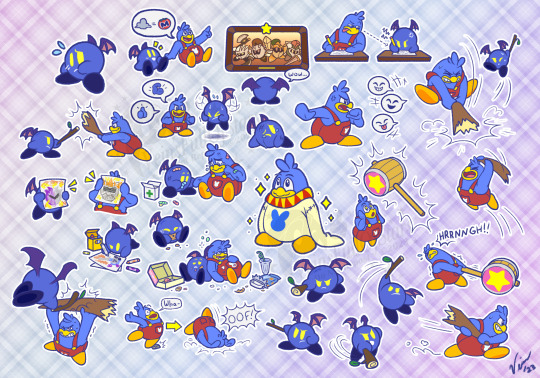
✨ May I interest you in some Dedede and Meta Knight as childhood friends? ✨
(ID: Kirby series fanart of King Dedede and Meta Knight reimagined as kids, interacting in various cute and wholesome scenarios such as coloring, cloud-watching, sparring with sticks, overindulging on sweets, protecting each other from bullies, and more. Design-wise, young Dedede is short and chubby with a smaller beak and three feathers sticking up from the top of his head. He wears a pair of red overalls with gold buttons on the straps and a pocket on the front with a white two-finger peace sign. Young Meta Knight is maskless and similar in appearance to Kirby, save for his yellow eyes, dark-blue complexion, and a pair of tiny wings on his back. Additional headcanons and worldbuilding for this AU under the cut. END ID.)
(AU info updated as of 11/02/24.)
Started on 10/09/23, finished on 10/11/23, updated 03/11/24, updated for color correction 11/02/24. NOTE: This was originally posted on my deleted account on 10/11/23. | Childhood Friends AU Masterpost
—
-This AU primarily takes place within the Kirby gameverse (with a few superficial elements borrowed from external media), the timeline starting many, many decades before the events of Kirby's Dream Land, eventually catching up to and following the main games’ canon (with nods to side games and some unique events added here and there for character flavor). I am trying to stay canon-compliant, but I’m also making things up as I go and changing them as needed, so no promises I won’t just go completely off the rails the more I workshop things, haha.
-I'm leaving ages nebulous in this AU (both because the series itself doesn't really give characters canonical ages and to keep the timeline a bit looser narratively), but - for clarity's sake - we'll say Dedede and Meta are both the equivalent of 7-to-11 years old here, though they first met a little earlier...
-Meta Knight is just called Meta for now - he won’t earn his title until after he starts his overstars military training with the Galaxy Soldier Army (GSA) in his late teens.
-That hammer belongs to Dedede’s mama - a former pro-wrestler - and will someday be passed down to him (once he’s strong enough to actually pick it up).
-In this AU, the GSA is an intergalactic military group fighting various malignant forces across the universe, their reputation generally positive thanks to a genuine effort on their part to balance acts of war and defense with acts of philanthropy, relief aid, and compassion, well-known enough to reach even distant Popstar. Most known Star Warriors - Sir Dragato, Kit Cosmos, Yamikage, etc. - are either long since passed on or retired somewhere outside of the story (with a few exceptions we may learn about later...). Though really more for background flavor and worldbuilding, the GSA becomes a crucial element to Meta's storyline later down the line, since - upon learning of them in his youth - he becomes enamored with their deeds and longs to be a knight himself (not yet aware of the hardships involved in becoming one).
-The kids like to spar and roughouse in their free time, but they sometimes get proper training from Dedede’s papa - a retired knight himself with connections to the GSA, who’d settled in Dream Land with his wife just before they had their only son. Meta looks up to him with the same admiration he has for the Star Warriors while Dedede doesn’t always see eye-to-eye with his well-meaning but strict father.
-In his early years, Meta is quite shy around people he doesn’t know well. In overwhelming situations, he tends to either shut down and go non-verbal or quietly slip away to recoup. That said, he is much more expressive around those he trusts, listening eagerly and chatting far more than he would otherwise. He also has a bit of an anger streak hidden just under all that resolve, though it takes a lot of prodding to bring it out...
-As a kid, Dedede is impulsive to a fault and likes to make wild plans that often put him and his buddies in precarious situations (when he actually follows through with them, that is). Meta is often the first to point out the flaws in said plans (if Para Dee doesn’t do it first) but inevitably ends up tagging along anyway, his wariness easily overturned by his curiosity.
-Despite the generally welcoming nature of the village, Meta still faces some measure of bullying due to his strange appearance and timid nature. Usually, he waits it out until either his tormentors get bored or Dedede steps in to defend him, but - as the taunts persist and his temper grows - it's only matter of time before he's the one getting into scraps rather than his bigger buddy...
#veins art#veins fanart#kirby series#kirby#king dedede#meta knight#star warriors#AU#childhood friends au#friendship#technically pre-relationship#but I'm gonna keep the tags platonic for now since they're still kids here#no weird gooey feelings yet#just a pair of good buds who really believe in each other#veinsfullofstars
84 notes
·
View notes